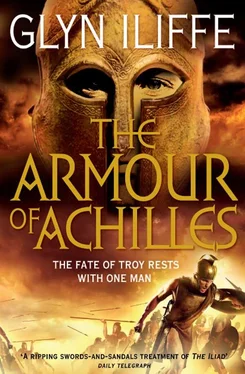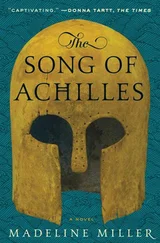Glyn Iliffe - The Armour of Achilles
Здесь есть возможность читать онлайн «Glyn Iliffe - The Armour of Achilles» весь текст электронной книги совершенно бесплатно (целиком полную версию без сокращений). В некоторых случаях можно слушать аудио, скачать через торрент в формате fb2 и присутствует краткое содержание. Год выпуска: 0101, ISBN: 0101, Издательство: Pan Books, Жанр: Старинная литература, на английском языке. Описание произведения, (предисловие) а так же отзывы посетителей доступны на портале библиотеки ЛибКат.
- Название:The Armour of Achilles
- Автор:
- Издательство:Pan Books
- Жанр:
- Год:0101
- ISBN:9781447205098
- Рейтинг книги:4 / 5. Голосов: 1
-
Избранное:Добавить в избранное
- Отзывы:
-
Ваша оценка:
- 80
- 1
- 2
- 3
- 4
- 5
The Armour of Achilles: краткое содержание, описание и аннотация
Предлагаем к чтению аннотацию, описание, краткое содержание или предисловие (зависит от того, что написал сам автор книги «The Armour of Achilles»). Если вы не нашли необходимую информацию о книге — напишите в комментариях, мы постараемся отыскать её.
The Armour of Achilles — читать онлайн бесплатно полную книгу (весь текст) целиком
Ниже представлен текст книги, разбитый по страницам. Система сохранения места последней прочитанной страницы, позволяет с удобством читать онлайн бесплатно книгу «The Armour of Achilles», без необходимости каждый раз заново искать на чём Вы остановились. Поставьте закладку, и сможете в любой момент перейти на страницу, на которой закончили чтение.
Интервал:
Закладка:
Paris reached across and took her other hand.
‘But you have love,’ he said, squeezing her soft palms with his rough fingers. ‘And soon the war will come to a head. My father is seeking new alliances with distant countries and, before long, strange and fearsome armies will come to our aid. The Greeks will be thrown back into the sea and we’ll be free again. As for being the most hated woman in Ilium, how can you say such a thing? The people worship you like a living goddess! Why do you think, in ten full years of war, they haven’t sent you back to Menelaus?’
‘Because your father won’t let them,’ Helen snapped, wilfully. ‘It’s Priam they worship, not me. All I’ve brought them is war and devastation.’
‘Nonsense. If anyone is to blame for this war, it’s me – and I don’t give a damn whether the people love me or hate me, just so long as they love you. Which they do.’
Paris pulled her gently to his side, where she could feel the warmth of his body contrasting the chill of the evening breeze blowing in from the sea.
‘Look at these men,’ he said in a low voice, pointing to the dozen guards stationed at intervals along the western ramparts. Each one was gazing out at the plain below, while straining to hear the conversation between Paris and Helen. ‘Do you know that each night the citadel guards throw dice over who will get the early watch on this part of the wall? Just so they can be here when you appear every evening after your meal, to be able to glance at your beauty. Did you also know that—’
A shout rang through the night air, cutting him short. He turned and looked at the tower guarding the entrance to the citadel, where an armed guard was pointing beyond the lower city to the plains in the south-east. Another soldier was leaning over the battlements and calling down to the guard hut just inside the gateway. Moments later dozens of soldiers were spilling out of its doors, hurriedly pulling on shields and helmets or looping scabbards over their shoulders.
‘What is it?’ Helen asked.
Paris held up his hand for silence as he strained to hear the shouts of the guard on the tower.
‘Someone’s coming,’ he said. ‘Horsemen, at speed, though I didn’t hear how many.’
‘Is it an attack?’
‘No, not at night and on horseback. Which can only mean—’
He set off at a run along the broad battlements. Helen followed, walking as quickly as her long, restrictive dress would allow. She joined her husband beside the tower, where he was leaning over the walls and peering down at the darkened streets below. A dozen horsemen were winding their weary way up from the east-facing Dardanian Gate, through the lower city to the entrance to Pergamos.
‘Isn’t that Aeneas?’ Helen enquired, leaning alongside her husband and straining to identify the faces of the men as they were met by the light of the torches fixed on the front of the tower. ‘And Apheidas, too.’
‘And Sarpedon,’ Paris added. ‘But why have they abandoned the southern cities?’
‘Abandoned?’ Helen asked in consternation. ‘What do you mean?’
Paris turned to her, his face pale and concerned in the darkness. ‘They were sent to defend Lyrnessus, Adramyttium and Thebe. We’d heard the Greeks planned to attack after we’d whittled down the garrisons, but—’
‘You mean the fighting has already restarted?’ Helen interrupted anxiously.
‘Yes,’ Paris replied. The sound of horses’ hooves on stone echoed from the gateway below. ‘And I must go and find out why they’ve returned so soon.’
He took Helen by the hand and led her down from the walls to where the horsemen were dismounting amidst a crowd of guards. As the horses were led away to be watered and fed – the sweat on their flanks showed they had been ridden hard to reach Troy – Helen could see that the newcomers were exhausted and filthy. To her alarm several of the men appeared to have lost weapons or parts of their armour, and three or four carried light wounds to their heads or limbs. As she appeared among them, white and excruciatingly beautiful in the darkness, every eye fell on her. She sensed the accusation in their tired gazes, the same silent condemnation that she had seen after so many battles in the past. Then Paris stepped forward and gripped Sarpedon by the shoulders.
‘What’s happened, man? Why have you come back?’
Sarpedon looked around at the faces of the citadel guards and shook his head. ‘Not here, Paris. Where’s Hector?’
‘In his palace, with Andromache,’ Helen announced, defying the looks on the faces of the men.
‘Then we must go there now,’ Sarpedon said. ‘We have news that concerns them both. If you’ll excuse us, my lady?’
The Lycian king bowed low, then with Paris at his side started up the sloping road to the royal palace, on the third level of the citadel. Aeneas, his youthful face almost unrecognizable beneath the dust and dried blood, gave Helen the glimmer of a smile before joining them. Apheidas gave her a curt nod before turning on his heel and following the others. His usual confident smile was strangely absent and of all the horsemen who had ridden in through the gate he looked the most preoccupied.
Helen began to follow, but her husband held up his hand and shook his head.
‘No, Helen. We must discuss this matter with Hector alone.’
‘And Andromache?’ Helen protested, feeling like a disobedient child.
‘Do not envy your friend, Helen,’ Sarpedon returned, his words thickly accented but clearly enunciated. ‘The news we have for her is not good. But I would be indebted to you if you could see that our escort are fed and rested.’
Helen watched the four men disappear up the cobbled street that ran between the magnificent buildings of Pergamos and felt a pang of dread tear through her insides. Thebe had been Andromache’s home before her marriage to Hector. Helen had never been there, but she almost felt she knew the city from Andromache’s homesick descriptions: a walled town in a green valley, beneath the wooded slopes of Mount Placus. Her father, King Eëtion, still lived there with seven of Andromache’s eight brothers; the eighth – Podes – was Hector’s closest friend and fought in the Trojan army. Of all the women in Troy, none had treated Helen with as much love and kindness as Andromache had, so if anything had happened to her family then Helen had to know. After all, the murderous Greeks were only in Ilium because of her own foolish iniquity. Every foul deed they committed was her fault, whatever Paris might say.
She turned to the captain of the guard and gave orders for the remaining horsemen to be fed and given beds. After the lines of soldiers had trudged off to the guard hut, she threw her hood over her head and disappeared into a passage between two high-sided buildings. The stars were bright in the narrow channel of sky overhead, forcing her to seek the shadowy obscurity of a nearby doorway. She listened intently for a moment, then clutched her hands together and bowed her head.
‘Mistress Aphrodite, why did you curse me with such beauty?’ she whispered bitterly. ‘What has it ever earned me but trouble? And what’s the use of fine looks if men still ignore me and exclude me from their councils?’
‘A woman’s body is a cage, sister,’ said a voice, ‘from which there can only ever be one escape.’
A figure emerged from the doorway opposite, draped in a black cloak that gave it the quality of deep shadow. A pointed white chin and pale lips were visible under the hood and for a shocked moment Helen thought it was Clytaemnestra. But her sister was back in Mycenae, of course, where Agamemnon had left her to brood over the murder of her daughter. Then white hands rose up to tip the hood back and reveal a beautiful but melancholy face, framed with thick black hair. Dark, unhappy eyes stared briefly at Helen, then glanced away to the street beyond the narrow passageway.
Читать дальшеИнтервал:
Закладка:
Похожие книги на «The Armour of Achilles»
Представляем Вашему вниманию похожие книги на «The Armour of Achilles» списком для выбора. Мы отобрали схожую по названию и смыслу литературу в надежде предоставить читателям больше вариантов отыскать новые, интересные, ещё непрочитанные произведения.
Обсуждение, отзывы о книге «The Armour of Achilles» и просто собственные мнения читателей. Оставьте ваши комментарии, напишите, что Вы думаете о произведении, его смысле или главных героях. Укажите что конкретно понравилось, а что нет, и почему Вы так считаете.












